Though I do have a short page where I recorded Doi's arrival, it is high time to devote a special page to him. Doi is seventeen. Doi is our boat boy. He is Tanzanian. On arrival he spoke Kiswahili, and very little English. He had primary school only. So we started by me teaching him English, and he teaching me Kiswahili. We started as equals in capability to speak each other's language, but I was of course ahead in theory of grammar and Kiswahili grammar: I read the books. So I could organize our language sessions twice a day, morning and evening, deciding what we would do and how we would do it. After some preliminary skirmishes (I ask ninauliza I asked niliuliza, I have asked nimeuliza), buy, bought bought, and so on, (re)discovering how Kiswahili is far more consistent that English with all its exceptions, irregularities, and crazy spellings, I headed for writing simple stories in English, explaining them in my best Kiswahili, and asking Doi to turn that into serious Kiswahili. Whenever there was no job at hand, Doi would sit somewhere with his daftari (exercise book), on which he had written: "Dhow Secondary School".
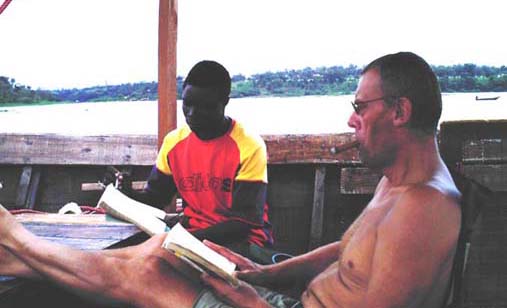
Photo: Doi teaching me Kiswahili, I teaching Doi English. My Kiswahili sounds as if I have a cigar in my mouth. No wonder: I have. But my father, visiting us, claimed that Doi's English also sounds as if he has a cigar in his mouth...
After a while, I ventured to ask him questions and try to
understand his answers, and then write the thing in English in his daftari. My first exercise-interview was
of course about his history and
family. So I came to know that when he was three or four, his mother fled for
his drinking father, with him and
his twin brother back to her family on the Ukerewe, a large Victoria lake
peninsula north of Mwanza (map).
At about the time I started to build the dhow he went off to Mwanza to search
for his father. He found some family members. My dhow contractor Daniel was one
of them. Nobody could give him the whereabouts of his father. He wanted to
return to his mother but Daniel invited him in his household since - probably
encouraged by the first advance for the building of my dhow - he just had taken a
second wife in a second house at a fair distance from his first, and could use
someone harmless to sleep in the house of one wife while he was with the other.
Also, an apprentice costing him food only was welcome on his shipyard. So, Doi
and I got to know Daniel and his yard at the same time. And, like Philemon, he
has participated in the building of the dhow right from the beginning. Doi lived with Daniel
until he got in big trouble after he had resisted Daniels extensive
looting of my dhow in the two weeks it was waiting for customs clearing.
Since this rising against his host Daniel on my behalf represented no personal interest
at all, it was only natural I took interest in combining a solution of his
problem with my efforts to acquire some agreeable dhow crew. So, a few months
ago, I asked Mwanza friends to buy him a bus ticket to Jinja, and there he was.
Sharing food goes less well than sharing language interests: Doi shows no
interest in whatever type of food I make. His (and Philemon's) breakfast is
strong tea with lots of sugar and milk, sweet white bread (yek!!!) with margarine. Lunch
and dinner is fish with ugali, the traditional African maize porridge (like
the Italian polenta). Always. He does not want me to buy anything else for him,
though if I offer him tomato's or sweet peppers, he will cook them with his
fish.
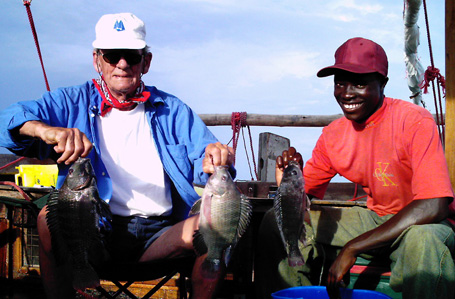
Photo: Doi with my father after buying three tilapia's right from a fisherman's canoe
If I have banana's or avocado's he will eat them. And "soda's" (Coca Cola, Fanta, bitter lemon) are always welcome. Like Philemon, alcoholic beverages do not have his interest whatsoever. For the rest he needs airtime to phone his family, he needs to have his trainers brushed every few weeks (never in my life I had any of my trainers brushed), and asks for toothpaste, herbal soap and a special type of amazingly cheap skin cream coming out of an elegant pink box that makes my dhow smell like a brothel after his bathing.
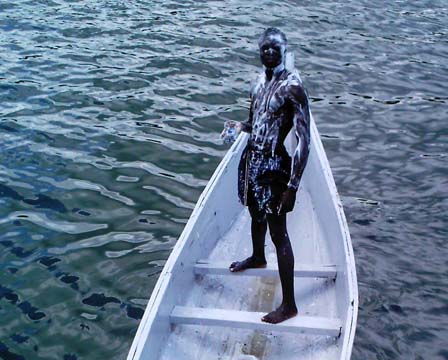
Photo: Doi bathing with his herbal soap before applying his awesome skin cream
I just buy the little he needs, so we are in a kind of family
structure: when other needs arise (doctors, travel what have you), I will meet
them. So I involuntarily became like a father, his savings bank with unspecified
reserves. He is not interested. If I would give him money he would not know what
to do with it. So I keep it in my pocket and we'll see where things are heading.
Doi is always in a good mood and always ready to join in any
action, be it deemed necessary, useful or just fun. He takes any dirty clothes
from me immediately, for washing.
On the shore, Doi is a success with the personnel of Kingfisher lodge and the
local fishermen. Usually at around four in the afternoon he will dress up in his
best clothes, comb his hair, take his English exercise book and paddle to the
shore. Many there like to listen him talk his Tanzanian version of Kiswahili
which is thought better than home Kiswahili by Ugandans and even Kenyans.
Sometimes educated town Ugandans or their children have a party on the shore
side of Kingfisher, with MAD. MAD is how I call the
Modern African Drum,
consisting of fridge-size speaker boxes and an amplifier set well over the ear
damage threshold, playing the same kind of BOOM BOOM from start to finish.
Island boy Doi observes, in his fine clothes, the whole thing from a distance
with intense interest.
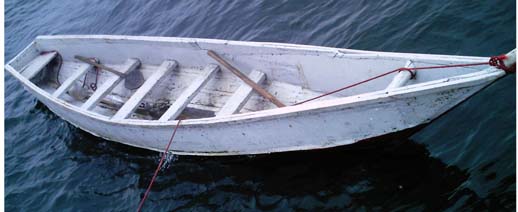 Photo: fixing the canoe's towline wrongly before sailing off so I have to stunt jump, under sail, between a moving dhow and canoe to bring things back in order |
Ready as he is to take any orders and learn anything, getting
things done according to his peers, Philemon and me, is not always easy for him.
Details thought by us not necessary to add can get him stuck in the execution of
a request, and we have learned to repeat to Doi requests to do some things even
though they simply have to be done every day or on every occasion of a specific
type. This is how we try to avoid that he inadvertently
drops
the anchor again on full sail before arrival, fixes the stays again downwind
instead of upwind (which is likely to break the mast), leaves ropes tied around
the lateen gaff when we start to hoist so we have to haul down again, drops our
rucksacks in the water on the bottom of the canoe, looses a large part of the
beer bottles in the new crate while trying, contrary to explicit orders, to lift
them from the canoe in the dhow on his own, fails to anticipate water current
and wind while canoeing to and from the shore, generally seems to refuse to
operate the canoe paddle such that he is going where he wants, fixing the canoe's
towline wrongly before sailing off so I have to stunt jump, under sail, between
a moving dhow and canoe to bring things back in order, switch off the fridge on
the wrong moments: "Doi! For what reason did you switch the fridge off??" Doi
(with a radiant big smile): "For no reason"; and forget to adjust the rear
anchor line in strong wind.
This he also did one time when an extreme East thunderstorm arrived
and I was on the airport to collect my visiting father. He should at least have
attached the rear anchor line to a forward point on the dhow, or untie and throw
off immediately, or, in case the tension on it would be already too much, simply
cut it. Otherwise the rear anchor line will draw the boat sideways on the wind Doi has heard this explicitly many times, and even done it on his own initiative
many times.
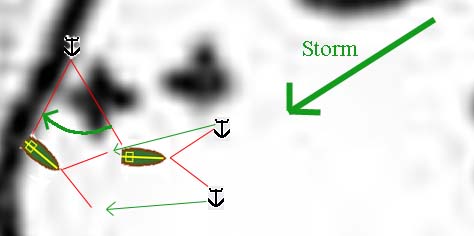
Picture: How to make you front anchors crab in a storm by keeping your rear anchor fixed: the rear anchor will pull your boat sideways enabling the storm to exert maximum force on the hull. Excellent recipe for stranding if the shore is lee
Back in the dhow from the airport, the bay was again flat like a mirror, but the storm had stranded the dhow, with the rear anchor still fixed, as a testimony of how Doi gave the wind the opportunity to exert maximum force on the dhow.
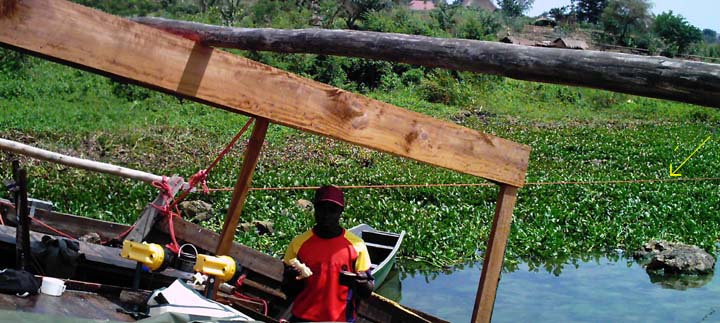
Photo: still completely unaware of his error, Doi insisted to be pictured after the stranding on the very stony shore. I could not resist taking him with the corpus delicti, the rear anchor line he neglected to release in the storm, on the background (the red polyethylene line going to the right, still under such tension that I had to cut it, after which it contracted like a Middle Age beleaguering catapult). Picture with my father from another angle
|
Lucky Luke's Rantantan. |
The next morning, after we had assessed that the damage was limited, and mood began to rise, Doi, still completely unaware of his error, insisted to be pictured after the stranding. I could not resist taking him with the corpus delicti on the background: the rear anchor line he neglected to release in the storm. In fact, Doi reminds me most of Rantantan (the dog in the Belgian Lucky Luke's cowboy cartoon): a strong fountain of cheerful and audacious action based on often original but always wrong conclusions from incomplete observations leads to a trail of smaller and larger disasters, alternated by an occasional success, as resounding as unintended and surprising to the hero - or not even noticed by him at all. The most striking likeness of Doi with Rantantan is that whatever the disaster triggered, it is impossible to get angry with him. You just laugh and start your troubleshooting.
Doi was highly charmed by my father. We wrote an English exercise story about my father in his daftari even when my father was still our guest. When the end of the exercise page was near and time for a final sentence had come, he shifted enthusiastically to Kiswahili and let me write down in English: "Even when he will have arrived in Europe, I will remember him for the many jobs he did on board".
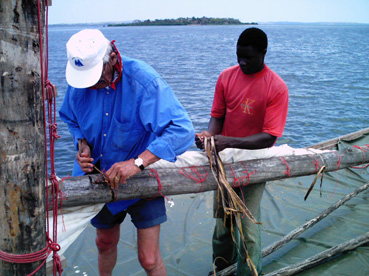
Photo: Doi teaching my father to fix the sail on the lateen
gaff with wetted banana leaves
Click for picture:
Doi and my father hoisting the sail
Doi also made a special impression on my father, otherwise a
man more directed to the technical aspects of life, like where and how to sail,
what club to use for the the next golf stroke, what to eat, and when to light a
cigar: my father started to ask me questions, quite unusual for him, as to
whether Doi had enough clothes, whether he would not better eat some other food
every now and then, be given some money for his own spending, and, seeing Doi
putting some prints of pictures (featuring Doi and my my father!) in his
overloaded photo album, suggested to buy another album for him (which of course
we did). Doi has a similar enthusiast appreciation for Dominic, the Kenyan Englishman owning
a small Sese island (see:
Sese Islands). Now I come to think of it, the amazing thing of Doi is his
particularly strong way of showing his appreciation of someone, to the person
himself and talking about the person to others. The way he showed appreciation to me, I
now realize, also made me pay attention to him at first when he roamed around
on Daniel's boat yard. In this respect Doi has some exceptional power that really
can make you feel good and satisfied with yourself. Lucky the girl who will have
him as his wife, if she is of the right mould that is: they won't get rich.
Naturally, in due course we shall sail to Ukerewe to visit his
his mother and twin brother.
Doi: honest to the bones, a completely loyal, inalienable and appreciated member of the crew. Of course, this cannot last for ever, but who then lives, then sees.
See also our later visit to Doi's village
